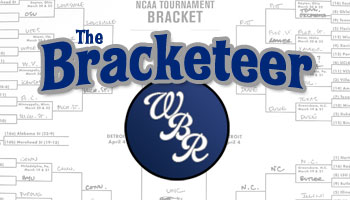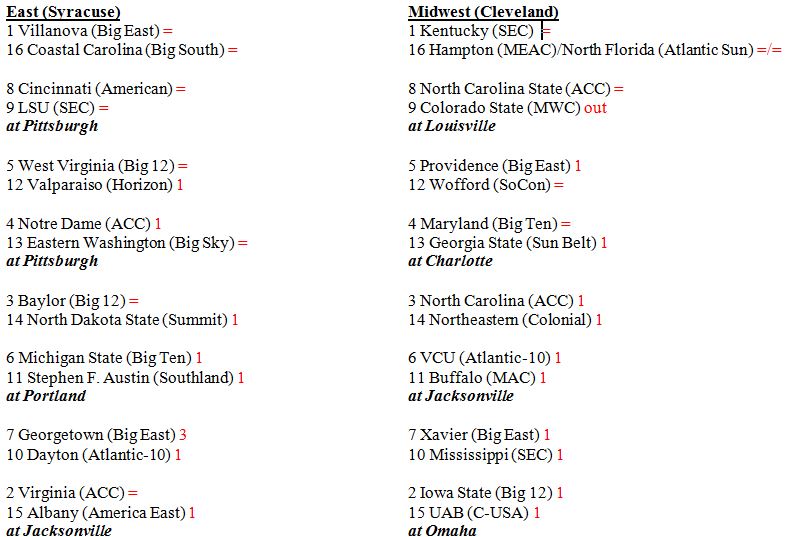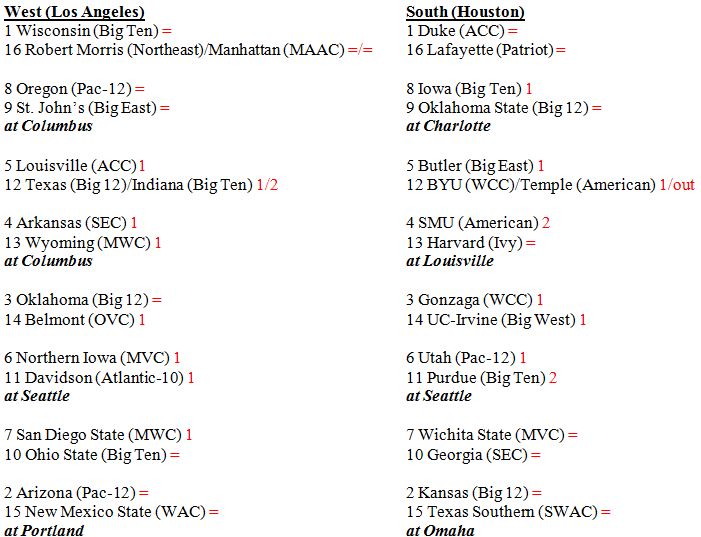Although Creighton isn’t in the NCAA Tournament this season, there are still NCAA Tournament games going on in Omaha. WBR will be covering the pods at the CenturyLink Center and have coverage on the site and Twitter. As part of our coverage we have some preview pieces on the teams coming to town and the tournament itself. Our resident bracketologist, The Bracketeer, checks in on how his final bracket prediction came out and some interesting notes on the tournament if you are filling out last minute brackets.
******
Now that Selection Sunday has come and gone and we now know the NCAA “field of 68”, let’s take a look at where my projections failed and, among other things, a formula to narrow down the national title contenders.
Like most people that did a bracket projection, I missed out on two teams – Colorado State and Temple. Like those same people, most did not have UCLA and/or Boise State into the NCAA field. I’ll be the first to admit that I screwed up when it comes to Colorado State over Boise State as I failed to recognize a basic principle that the selection committee uses as a separator – regular season conference championships. Boise State and Colorado State had very similar résumés when it came to RPI, SOS, record vs. top 50, etc. The one separator was that Boise State went 14-4 vs. Mountain West Conference competition, while Colorado State went 13-5. Yes, it is just a one game difference but the committee has shown previously that they will reward conference regular season championships with an at-large bid should they not win their league’s automatic berth.
As for UCLA, I won’t say that the Bruins absolutely should not be in the tournament. I will say that it was a major surprise to see them not part of the “first four” games. When comparing the Bruins résumé to other bubble teams, I thought they should have been a little further down the consideration list compared to others.
Below is my final projection from Sunday at just before 5 p.m., CT, with red markings denoting which seeds I got exactly correct (=), within one seed (1), etc.
34 of 36 at-large bids correct (missed on Boise State and UCLA)
Of the 68 overall teams:
- •32 were seeded exactly
- •62 were within one seed line
I thought the committee generally showed that RPI top 50 wins mattered, but the amount of attempts to win games against top 50 teams did not matter as much. This certainly showed in the seeding of:
- Dayton: “last four in”, 1 RPI top 50 win, projected to be a team that was safely in…
- Xavier: “6-seed”, 8 RPI top 50 wins, projected to be in an 8/9 game by many…
This next point is nitpicky at best as both Gonzaga and Iowa State ended up in the same bracket, but I thought the three extra top 50 wins that the Cyclones picked up in the Big 12 Tournament was enough to move them to the 2-seed line. Iowa State tied for the NCAA lead with 13 RPI top 50 wins (Villanova), while Gonzaga, who certainly had fewer chances to play those games, had six.
The only seed for a team that really surprised me was Georgetown receiving a 4-seed. Granted, the Hoyas did end up with a bit of a tough draw – having to travel 2500 miles from Washington, DC, to Portland, OR, – while their opponent, Eastern Washington, will have a 350-mile drive.
Four Factors
Although picking anyone other than Kentucky to win the 2015 national championship would seem to be a reach, below I’ve listed my four factors that have weighed heavily in determining the winner over the last 15 years.
RPI TOP 15:
Of the last 15 national title winners, 14 had an RPI of 15 or better heading into the tournament. Only Connecticut last season (RPI 23) was able to buck this trend. So, along with Kentucky, you can also include Villanova, Kansas, Wisconsin, Arizona, Duke, Virginia, Gonzaga, Iowa State, Baylor, North Carolina, SMU, Maryland, Northern Iowa and VCU as teams that fit this profile.
6 OR FEWER LOSSES HEADING INTO THE NCAA TOURNAMENT:
Of the last 15 national title winners, 12 had six or fewer losses heading into the Big Dance. Michigan State (2000) and Connecticut (2011 and 2014) were able to string three great weekends of basketball together in taking home the NCAA hardware. This eliminates: Kansas, Iowa State, Baylor, North Carolina and VCU.
NO RPI TOP 100 LOSSES:
Bad losses usually don’t find their way onto national championship team’s résumés. Of the last 15 national title winners, only three had a loss to a team with a regular season-ending RPI of 100+:
- Michigan State in 2000 (at Wright State)
- North Carolina in 2005 (at Santa Clara)
- Connecticut in 2014 (at Houston)
This eliminates: Wisconsin, Arizona and Northern Iowa
WIN YOUR CONFERENCE TOURNAMENT:
It’s regarded by some that losing early in your conference tournament could be beneficial as to allow for some rest before making your NCAA tournament run. However, momentum seems to play a more positive role. Of the last 15 national champions, 9 have won their conference tournament in that same season. Using this parameter, this also eliminates: Duke, Virginia and Maryland.
********
When using all four of those metrics, it leaves the following four teams with the best chance for the national title: Kentucky, Villanova, Gonzaga, and SMU.
If Kentucky were to win the national title and complete a perfect 40-0 season, it would go against the grain as far as the success of the overall #1-seed. Since the selection committee started designating an overall #1-seed in 2004 only three teams with that distinction have won the title – Florida in 2007, Kentucky in 2012 and Louisville in 2013.




